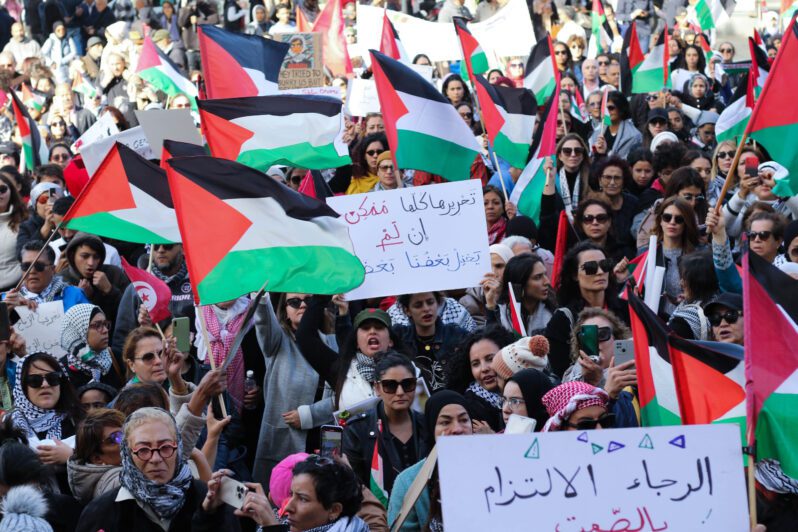Main Arab Legal Events: The Legal Agenda’s Perspective Weekly Note no 23 (4-10 February 2013)

The Constitutional Court in Libya: The Unconstitutionality of the Text that Required Men to have their First Wife Consent to them Marrying a Second One
Yemeni Judges Mobilize Against Party Politics in the Judiciary, and Call for Dismissing the Justice Minister and the Supreme Judicial Council
Tunisia Judges Pursue their Protests in and out of Courts for Independence
After Several Judicial Warnings: The Yemeni Government Complies with the Legal Verdict in the Injured Revolutionaries’ Case
Trials of Civilians before Military Courts now in Morocco after Egypt: the Case of Akdim Azik’s Camp after that of Qursaya Island
The Administrative Court Orders a Ban on YouTube in Egypt over a Video Denigrating the Prophet
Prisoners of Conscience on a Hunger Strike in Oman
1- Libya:
-The Constitutional Chamber of the Supreme Court ruled on some of the constitutional appeals and overturned the unconstitutional text that required men to have their first wife consent to them marrying a second one.
2- Yemen/Tunisia: Judges’ Movements
-A number of Yemeni judges called upon all their peers to organize a sit-in and go on a strike in all courts to overturn the Supreme Judicial Council and dismiss the Justice Minister in an effort to revive the judicial revolution and counter all attempts of putting the Judiciary at the service of party politics. Judge Abdul Wahhab Katran had already warned on the agenda’s electronic website against the “Salafinisation” and “Brotherhoodization” of the Yemeni Judiciary, following several measures that caused prejudice to the interests of those assigned to the High Judicial Institute and its graduates. Within the same context, Tunisian Judges are pursuing their movements calling for the adoption of a law on the establishment of a temporary committee for the supervision of the Judiciary.
3- Yemen:
-The Ministerial Committee responsible for treating injured revolutionaries declared having launched the procedures of taking 20 people abroad in compliance with the legal verdict relevant to the wounded revolutionaries’ case. Such a declaration comes after several judicial warnings and a hunger strike held by the wounded revolutionaries and their parents.
4- Morocco:
-The Qursaya island’s case: Civilians from the desert are being tried before a military court in Morocco (24 people have been arrested since November 2010) for having called for the improvement of their conditions in a sit-in where thousands of people took part leading to violent clashes with the security forces. Such an event brings back to memories the Qursaya Island’s case where residents were detained for having refused to leave their territories after the military institution’s decision to seize them.
5- Egypt:
-The Administrative Court ordered the government to ban the video file-sharing site “YouTube” for a month over its ongoing broadcast of the film “Innocence of Muslims”, despite a decision to block it. It should be noted that the film sparked a major outcry last year in the Islamic countries.
-The Public Funds Prosecution called for waving the judicial immunity of the head of the Judges’ Club Ahmed El-Zend in order to investigate charges according to which he illegally took over lands. The Egyptian Judges’ Club considered these measures as reprisals against El-Zend. Heads of the districts’ Judges’ Clubs expressed full solidarity with El-Zend, stating that the case’s aim is to tarnish the reputation of one of the leading figures of the Judiciary.
Beyond the Weekly Note:
-Saudi Arabia:
-The Arab Network for Human Rights Information denounced the arrest by the Saudi authorities for the second time since the beginning of 2013 of 26 women and 13 children who have gathered to call for the release of their relatives that have been arbitrarily detained for several years.
-Kuwait:
-The court of cassation endorsed the criminal court’s ruling that condemned the blogger “Lawrence Al-Rashidi” to 10 years imprisonment and forced labor for having defamed Kuwait’s Emir through “posting defamatory comments on the situation in the country, as well as audiovisual recordings he himself had prepared on YouTube”.
-Sultanate of Oman:
-Several prisoners of conscience in Oman convicted of insulting the Sultan and illegal assembly began a hunger strike on February 9, 2013, as a sign of protest against their detention, calling for keeping the Judiciary away from external influences.
Prepared by Christelle El-Feghaly



